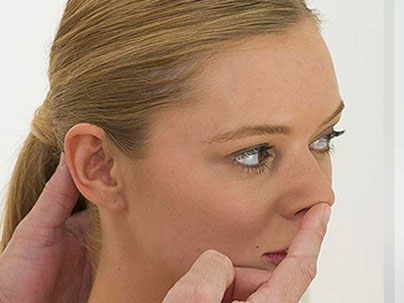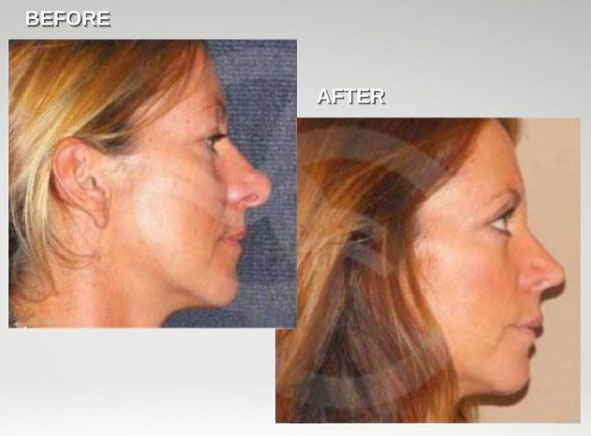Nasal Tip Surgery: Master the Tip, Master the Nose
Rhinoplasty doesn’t always involve the nasal bones - nasal tip surgery focuses on reshaping just the nose cartilage.
The shape of the tip of the nose has a big influence on the overall appearance of the nose. A tip that is too wide, or too pointy, can diminish the overall beauty of the face.
Not only can nasal tip surgery deliver great aesthetic results, but it also has a quicker recovery time than a full nose job, without the black eyes associated with breaking the nose. Read on to find out if you’d be a good candidate for nasal tip surgery.
What is nasal tip surgery?
Nasal tip surgery is sometimes called a “mini nose job” because it can make some aesthetic improvements to your nose using less invasive surgery techniques. Small pieces of cartilage are removed, with the remaining cartilage stitched together to create a more refined nasal tip. In cases where the patient has very thick skin, the skin is also thinned out.
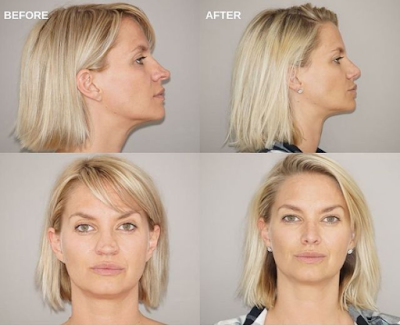
Who can benefit from nasal tip surgery?
Nose tip reshaping is most frequently carried out in conjunction with full rhinoplasty surgery. Filing the bone is the only way to tackle issues such as a dorsal hump. But if your aesthetic concerns relate to the end of your nose, and your nose is otherwise free of lumps and bumps, nasal tip surgery could be perfect for you.
Here’s what can be achieved with nose tip reshaping surgery:
- ✓ Shortening of the nose
- ✓ Lifting of a drooping nose tip
- ✓ Reduction of a bulbous or wide nose tip
- ✓ Widening of a narrow nose tip
- ✓ Reduction of flared nostrils
- ✓ Reshaping of nostrils/columella (the bit between the nostrils)
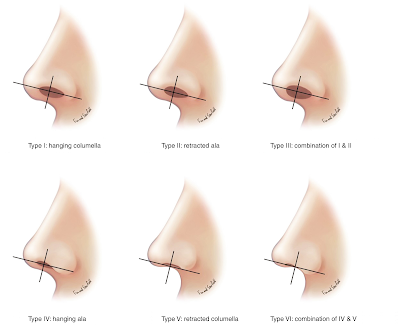
Nasal tip surgery for a long or drooping nose
An overly large nasal tip or hanging columella can often cause the nose to look long or droopy.
The angle of the tip of the nose (the amount the nose is turned up) also plays an important role.
Measured from the lip up, the ideal range of rotation is 90 to 100 degrees for men and 95 to 110 degrees for women. A female nose that is rotated less than 90 degrees to the face is ‘over-projected’ and therefore looks droopy, long and masculine.
To bring the rotation into the ideal range, the nasal tip and/or columella needs to be reduced in size. Excess tissue is removed during surgery and sutures are placed to lift the tip and alter the angle of the nose.
It’s worth noting that a temporary improvement in the appearance of a drooping nasal tip can be achieved with Injectables. A small amount is injected at the base of the nose in between the nostrils, or possibly into the nose tip itself. This relaxes the fibres of the depressor muscle that pulls the nose downward and lifts the nose for 4 to 6 months.
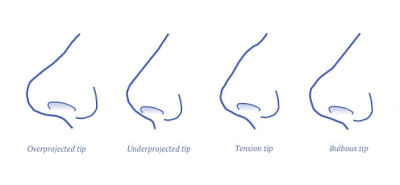
Nasal tip surgery for a bulbous, wide or narrow nose
A bulbous nose is one that appears to have a "ball" on the end. This ball is typically due to excessive width of the cartilage, excessive “spring” to the cartilage making them bowed, or cartilages that are spaced too far apart, giving the nose a boxy appearance. Sometimes a bulbous tip can be due to thick nasal tip skin.
The ideal nasal tip shape should be triangular when viewed from below but without sharp edges or angles (called a soft triangle). The actual tip of the nose should be approximately 1/3 of the width of the nostrils. There should be a gentle transition from the tip of the nose to the nostrils, without any sharp creases or edges.
For those who feel the tip of their nose is too narrow or pointy, the nasal tip can be widened by using cartilage grafts. The angle of the nasal tip may also be adjusted, resulting in a more flattering angle and better definition of the shape of the nose.
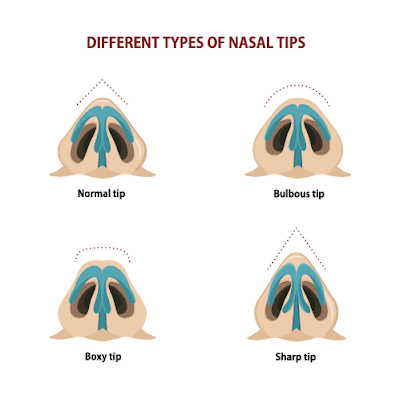
Nasal tip surgery for reshaping of nostrils
The rim of the nostrils is called the alar rim. If the alar rim is retracted it can mean too much nostril is showing and if the alar rim is hanging it can give the nose an unattractive shape. Sometimes the nostrils appear too wide or flared or they may be asymmetrical.
Alarplasty (the name given to nasal tip surgery that’s focused on the nostrils) can reshape and resize your nostrils to suit your nose. The correction is carried out by excising a small amount of skin from the nostrils and moving the cartilage. Sometimes cartilage grafting is needed.
In many cases, the result is that the base of the nose looks narrower and the nose appears more symmetrical. Issues with the alar can be as a result of previous rhinoplasty surgery (or facial injury), and an alarplasty is a good way to refine the results.
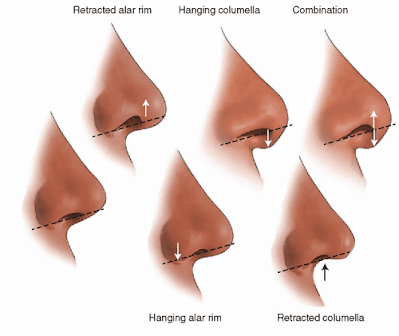
How long is recovery from nasal tip surgery?
Because nasal tip surgery involves reshaping only skin and cartilage and none of the underlying bones, recovery time is typically shorter than a full rhinoplasty. Bruising will be comparatively minimal and should be more or less gone within 8-10 days. The nose will be swollen at this point but not noticeable to others.
Swelling of the nasal tip resolves slowly, and it can take a full year for the swelling to completely subside. Despite this, most patients are thrilled with the appearance of their nose once the tape comes off and know it will only get smaller over time.
One of the great things about nasal tip surgery is that it can be more subtle than full rhinoplasty so you won’t risk looking “overdone” or drastically different. This surgery simply helps to balance the symmetry of your facial proportions.
Would you like to know more about nasal tip surgery? Contact Ocean Clinic for a free consultation.
